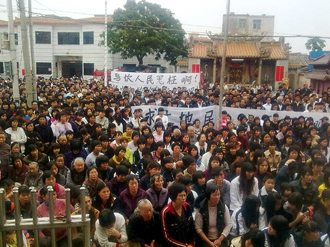The death of its leader while in police custody has provoked Wukan Village to erupt into open rebellion. Villagers have chased out government officials, set up roadblocks and armed themselves with homemade weapons.
On Monday residents of the coastal village in Guangdong Province learned that a representative chosen to negotiate with local Communist Party officials had died in police custody. The official explanation that the 42-year-old Xue Jinbo, a butcher, died of a heart attack was rejected after relatives saw signs of physical abuse — broken thumbs, bruised knees and a bloody nose.
“We’ve been to the funeral home a couple of times but the police won’t release his body,” said Xue’s 24-year-old son-in-law.
Crowds of villagers continue to stage noisy daily rallies in front of Wukan village hall. Roads leading into town were blocked with tree limbs by groups of young men carrying walkie-talkies. While villagers are trying to keep party officials at bay, they are also under siege by heavily armed riot police who set up roadblocks to keep out deliveries of food and other supplies from reaching the town of 20,000. Residents claim they are receiving food from adjoining villages.
The Wukan uprising began in September thousands rallied to protest what they deemed were illegal seizure of farmland. The land was sold to developers but little or no compensation was paid to the farmers, claim villagers. Police cars were destroyed and government buildings looted during two days of protests. Order was restored with undue brutality by riot police, claim villagers.
Acting on a pledge to investigate the villagers’ allegations, the local party fired two village party officials and offered to negotiate with a group of representatives chosen by villagers. Xue was among the 13 people chosen. Those moves appeared to restore calm among villagers.
That calm evaporated two weeks ago when an official of Lufeng County condemned the earlier protests as illegal and accused Wukan representatives of collaborating with “overseas forces that want to sow divisions between the government and villagers.”
That led to a sit in by villagers. Last Friday party officials sent in a group of plain-clothes policemen who abducted Xue and four other representatives. News of Xue’s death emerged two days later, setting off open rebellion among villagers.
News of the Wukan uprising has been blocked by the state-run Xinhua news agency. However, it sought to discount the “rumors” that Xue had been tortured to death, reporting Tuesday that he had died of cardiac arrest a day after confessing to his role in the riots in September. It said Xue had a history of asthma and heart disease and cited a report by forensic investigators who found no evidence of abuse.
“We assume the handcuffs left the marks on his wrists, and his knees were bruised slightly when he knelt,” it quoted Luo Bin, deputy chief of the Zhongshan University forensics medical center.
The top party official in Shanwei which has jurisdiction over Wukan village, said Xue’s death would be investigated, but warned residents against further unrest.
He added that a news conference would be held on Thursday.
Social unrest is becoming an increasing headache for China’s central government as official corruption and the growing wealth disparity — much of which appear to reflect the rewards of official corruption — are fueling strikes, rallies and other forms of protest.


